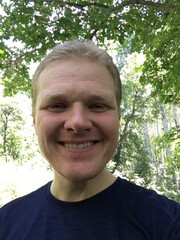Events
Jan 11, 2024
Seminar (2024-01-11)
School of Biomedical Sciences is pleased to invite you to join the following seminar:
Speaker: Dr. Ben Myers, Assistant Professor, Department of Oncological Sciences, Huntsman Cancer Institute, University of Utah School of Medicine
Host: Dr. Mu He
Career Talk
Date: 11 January 2024 (Thursday)
Time: 2:30 pm – 3:30 pm
Venue: Lecture Theatre 1, G/F, William M.W. Mong Block, 21 Sassoon Road
Sign-up: https://hku.au1.qualtrics.com/jfe/form/SV_9TxVIDikSyAdgEK
Seminar
Talk Title: Biochemical mechanisms of hedgehog signal transduction in development and cancer
Date: 11 January 2024 (Thursday)
Time: 3:30 pm – 4:30 pm
Venue: Lecture Theatre 1, G/F, William M.W. Mong Block, 21 Sassoon Road
*Prior Registration is not required to attend this seminar
Biography

Ben Myers is an Assistant Professor at the University of Utah School of Medicine in Salt Lake City, UT, and an investigator with the Huntsman Cancer Institute. Ben’s research focuses on how cells communicate with each other during embryonic development and how errors in cell-cell communication cause birth defects, cancers. and other pathologies. His group focuses on the Hedgehog pathway, combining biochemical and structural approaches with cell biology and in vivo models to tease apart this pathway’s unusual transduction mechanism. Ben’s lab also studies signaling pathways operating within the primary cilium, a tiny antenna-shaped structure at the cell surface with critical links to development, physiology, and disease. Ben received his Ph.D. from UCSF, where he worked with Nobel laureate David Julius on the structure, function, and physiology of ion channels and GPCRs in the nervous system, followed by a postdoctoral fellowship in developmental and cancer signaling with Philip Beachy at Stanford University.
Abstract
The Hedgehog pathway controls tissue and organ development and, when misregulated, drives several widespread cancers. The primary regulator of Hedgehog pathway activity at the cell surface is an atypical G protein-coupled receptor (GPCR) known as Smoothened (SMO). Despite decades of research, we know very little about how SMO is activated or signals intracellularly. This has severely limited our understanding of how Hedgehog pathway shapes tissue and organ physiology, and hindered efforts to control this pathway therapeutically. Our recent work has provided foundational insights into SMO activation and intracellular signal transduction, involving 1) critical and unexpected roles for membrane sterols as endogenous SMO ligands, and 2) an unprecedented mechanism of controlling protein kinase A (PKA) enzymatic activity. These findings help to resolve longstanding mysteries in developmental and cancer signaling, reveal new mechanisms of lipid and kinase-dependent signaling that may apply broadly to other pathways, and suggest novel cancer therapeutic strategies.
ALL ARE WELCOME
Should you have any enquiries, please feel free to contact Miss Angela Wong at 3917 9216.
